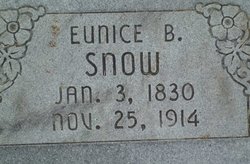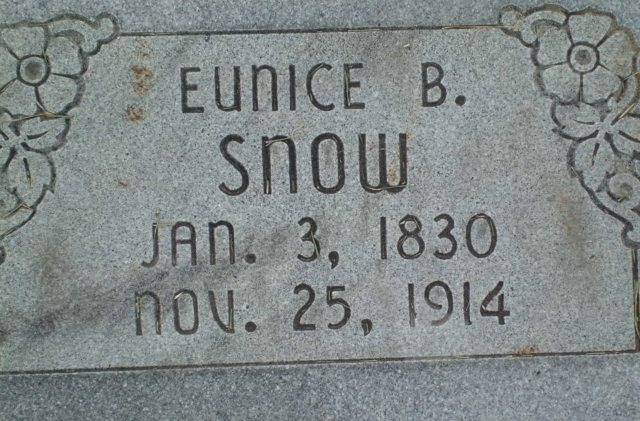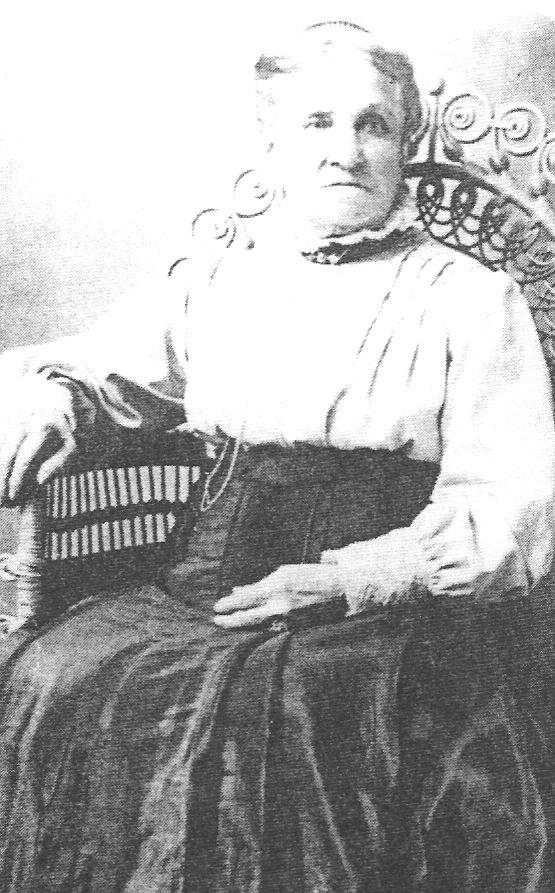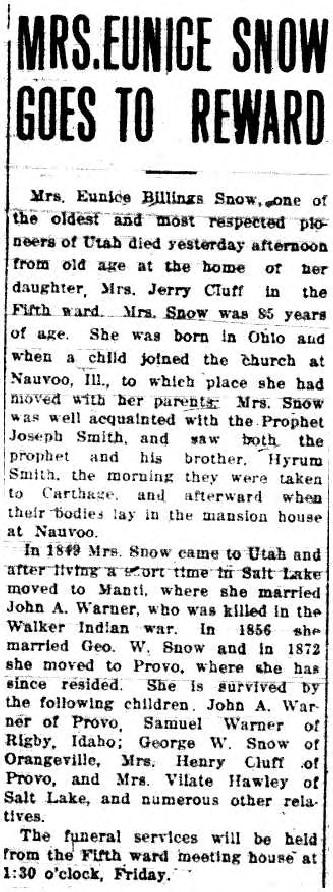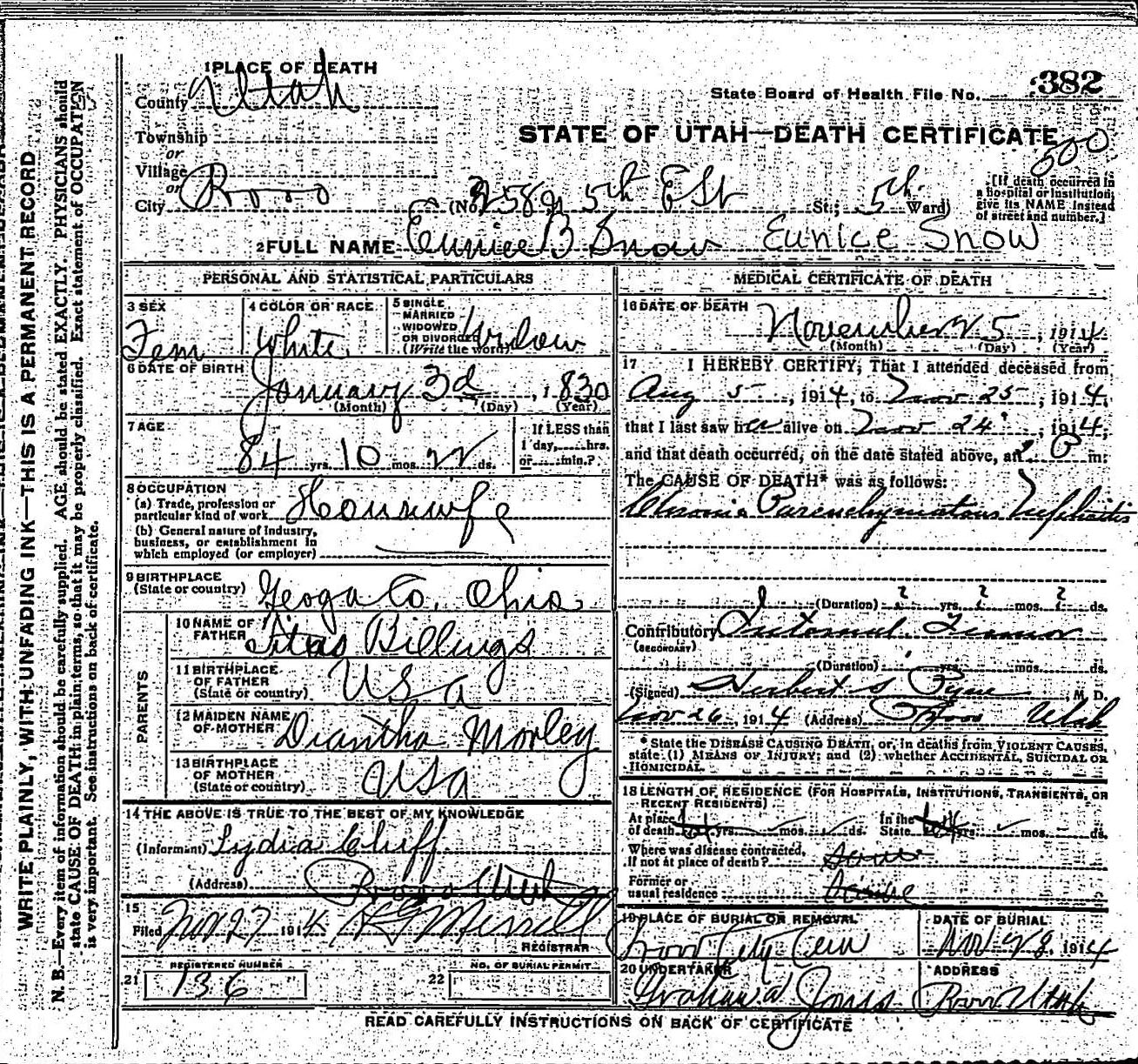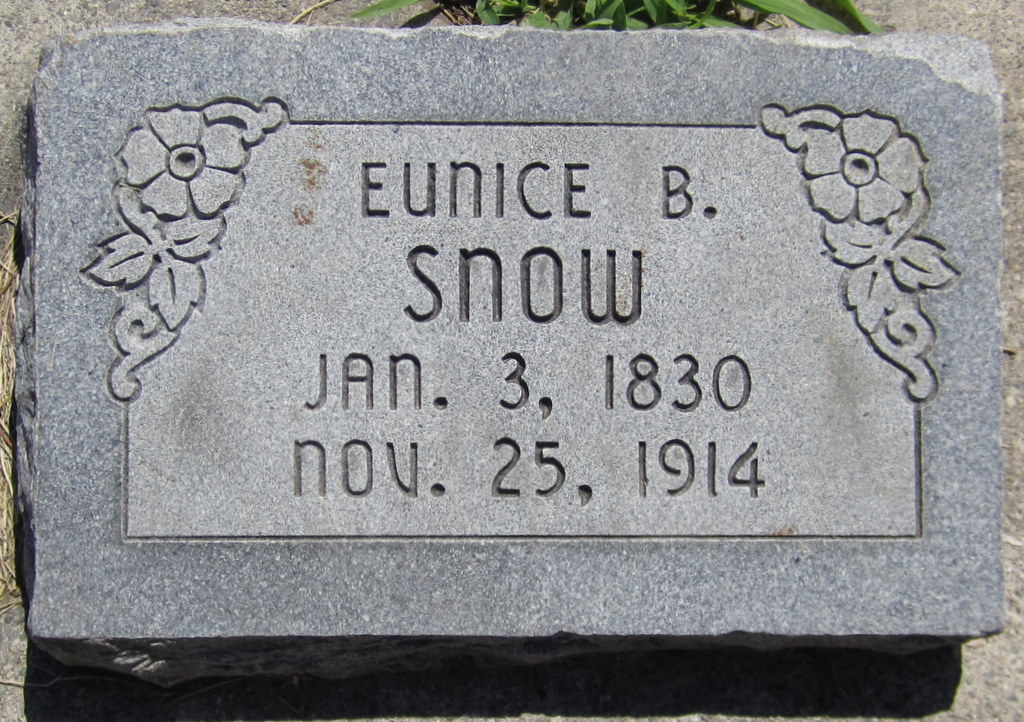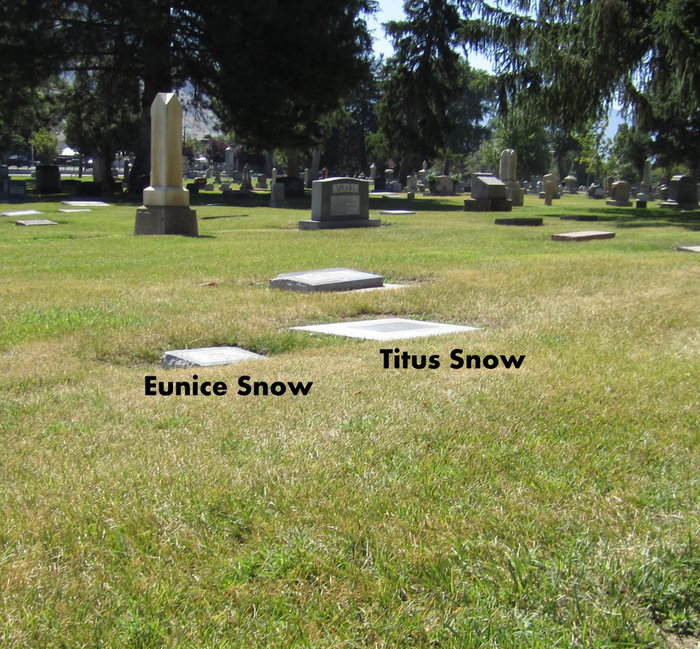She married John Ely Warner at Sessions Settlement just outside SLC, then they settled in Manti where John died from 75 arrows found in his body at his grist mill.
Eunice was a nurse for years, married George Washington Snow after 3 years of being a widow.∼The Woman's Exponent 1910-09-01 vol. 39 no. 3
A SKETCH OF THE LIFE OF EUNICE BILLINGS SNOW
My mother was set apart by the Prophet Joseph Smith for the especial calling in obstetrics. She practiced for over fifty years and never lost a case of the mother. Being accustomed to attend all meetings with my mother; I was present at meetings of the first Relief Society in the Church in Nauvoo and when my mother was called as a teacher with Sister Markham as a companion. I was not old enough to be a member of the organization. During the building of the Temple, my father worked very often on it and at those times we lived quite close, mother being very sick for the first three months after we moved to Nauvoo. My youngest brother died at Nauvoo in his tenth year. His name was Titus. He was buried in the cemetery at Nauvoo. Brothers Heber C. Kimball and Newel K. Whitney were called in to administer to him and while they were administering to him he died.
I saw the Prophet lay the corner stone of the Nauvoo Temple. I was a member of the Nauvoo choir from the time I was twelve years old and sang at the dedication of the Nauvoo Temple. I received my endowments in the Nauvoo Temple when I was sixteen years old. I was baptized when I was nearly sixteen, in the font of the Nauvoo Temple.
Previous to my fifteenth year, I remember hearing the Prophet speak on celestial marriage and although I did not fully understand it yet my parents made it plain to me when I was fourteen or fifteen years old and Brother Kimball supplemented their teachings. Before I was sixteen, when my mother was very sick, Sister Vilate Kimball would come to administer to her wants, bringing foods and dainties. No doubt she saved her life, since she had no one but myself to do for and I was so very young and inexperienced at that time.
I remember when the "Nauvoo Expositor" was destroyed. This was a paper established by the apostates and it was creating considerable trouble, so much that our brethren felt that it should not exist. It was destroyed after a short time and many of the people were very much enraged at the time and it pointed to the beginning of mobocracy. The paper was conducted by William and Wilson Law, Brothers Robert D. Foster and Dr. John C. Bennett.
Some of the most impressive moments of my life were when I saw the "Nauvoo Legion" on parade with the Prophet then Gen. Joseph Smith with his wife, Emma Hale Smith, on horseback at the head of the troops. It was indeed an imposing sight and one that I shall always remember. He so fair and she so dark in their beautiful riding habits. He in full military suit and she with her habit trimmed with gold buttons a neat cap on her head with a black plume in it while the Prophet wore a red plume in his and a red sash across his breast his coat was black while his white pants had red stripes on the outside seams. He also wore a sword at his side. His favorite riding was named Charlie, a big black steed.
My father for many years was captain of the cannon when the legion was on parade and many a time my mother and I made cartridges for him. He kept the cannon in charge.
After the destruction of the "Expositor" many of the apostates became wild and revengeful thirsting for the Prophet's blood. The staunch and loyal Latter-day Saints in Nauvoo felt that the Prophet was in danger and although they lived with a strong faith in the Lord that all would be well, yet they tried to dissuade the Prophet from remaining in Nauvoo and succeeded so far that he moved across the Mississippi river to Montrose. He did not stay there very long however as some of his friends persuaded him to come back, thinking possibly that his presence would tend to pacify the crowds of Boisterous people on the streets. I remember hearing the Prophet the last time he spoke in Nauvoo. It was in the day at the Bowery, which was filled with a goodly number of the saints. He said, "I go like a lamb to the slaughter", referring to the great shadow which seemed even then to hover over his life and to foreshadow his impending doom. On the last day which he spent in Nauvoo, he passed our house with his brother, Hyrum, both riding. My mother and I were standing in the door yard and as he passed he bowed with uplifted hat to my mother. Hyrum seemed like one in dream sad and despondent taking no notice of any one. They were on their way to the Carthage jail and it was the last time I saw the Prophet alive. Shortly after this, my father came home and told my mother that the Prophet and his brother had been murdered whereupon my mother exclaimed, "How can it be possible? Will the Lord allow anything like that?" And immediately she sank back in her chair and fainted. When she came to herself, my father lamented the fact with her, but cited the case that other Prophets in the world's history had been killed. The bodies were brought into Nauvoo the morning after the murder and placed in the Nauvoo Mansion to be viewed by hundreds of people. The Latter-day Saints in the city were full of melancholy, and sadness prevailed over the place. Tears were shed on every hand, and deep mourning shrouded the city. Lucy Mack Smith, Emma Hale Smith, my mother and I together viewed the bodies and I shall never forget the impression made upon me when the Prophet's mother saw the bodies of her dead sons. Falling on her knees and clasping her hands she cried out, "O God, why were my noble sons permitted to be martyred?" Then controlling herself with a mighty effort, she said, "Thy will not mine, O Lord, be done." After this terrible murder, the condition of the Church was a pitiable plight with confusion on every hand, until the Lord raised up a new prophet in the person of Brigham Young a second Moses, to lead the people out of their sad difficulties.
MY TRIP TO MANTI.
In 1849, during the October conference which was held in Salt Lake City my father and mother with my husband and, myself were called to go with Isaac Morley as our leader to Manti to settle the first colony there. My husband's name was John E. Warner and my father's name was Titus Billings. I was married eight miles north of Salt Lake City to John E. Warner at a small settlement called Session's Settlement.
We prepared for our journey and started in the latter part of October. The trip occupied three weeks, which is strange to say when one thinks that we make a continuous journey only camping overnight and making our own roads as we traveled along. On our way, my mother was quite ill and I had to prepare the meals when I was not driving a yoke of cattle. My father drove the other yoke of cattle and my husband was busy attending to the loose cattle which we had with us. We reached Manti on the 21st of November. It being the fall of the year, everything was bleak and dreary. There was of course no house in sight only the brush covering the ground and for six weeks we lived in our wagons with only a brush covering to protect us from the storms. In the meanwhile, my husband went to the mountains and there sawed logs with an upright saw to construct our dwelling. They sawed the logs in two for the sides of the house and they made sheathing for the roof and floor. They put in small pieces of wood between the logs for chinks and plastered mud all over the outside to keep it warm. The house consisted of one room and we had a small stove which we had brought across the plains, and besides there was a fireplace, which kept the place warm. We had no carpet, but we had beds and dishes, so we considered that we were quite comfortable. When we had lived there two weeks my first child was born, but due to hardship and suffering the little thing was stillborn, and I came very nearly losing my own life I was sick for quite a while, and my mother, who was a midwife, nursed and attended me. She was the only doctor, midwife, and nurse at the time in Manti. My child I think was the third one born in the little settlement. Many of the first settlers lived in dugouts along by the stone quarries, and it was not unusual for them to get up in the morning and find the rattle snakes crawling along the eaves of their dugout homes. The people did not suffer from any pestilence nor great conflagration, showing that the Lord was kind to them and scattered blessings on his servants who had gone forth to establish new settlements in His name.
My father and my husband during that first winter drove our cows to the Warm Springs and every morning about ten o'clock they would take some bran to them and milk them. That gave us fresh milk once a day and in that way we felt that we had some of the luxuries of life. My parents were very particular in apportioning that would last our foods every day so they until the next seedtime and harvest and by that means we did not suffer during that first long, cold winter. You understand, it would be difficult to get supplies from the other settlements or from Salt Lake City, on account of the means of transportation through the canyons being blocked with snow. As soon as possible the brethren erected a large log building near the stone quarry where we could hold our meetings regularly and my husband, Brother Warner, conducted the first singing and led the first choir in Manti. Among the first members of the choir were Brother Warner, my father and mother, Sister Hannah Morley, and myself. When we moved to our city lots and a large rock meeting house had been built in the center of town Brother Warner continued to lead the singing there until his death.
Brother John Lowry was the first bishop of Manti and my husband served as clerk of the ward. He also served as clerk to Judge Peacock during the sessions of the District Court. He acted as well as clerk of all public meetings. Brother Warner was well educated in his native state Massachusetts. He played well on the flute, which by the way was the only instrument of music which we had at first in Manti. This flute was a twenty four silver mounted one and very valuable. I played in the first theater that was organized in Manti and in the Thespian Society we often sang duets.
My mother, Diantha Morley Billings, was the first president of the first Relief Society that was organized in Manti. All my children, except the last one, were born in Manti I have had eight children, seven of whom were born in Manti. I have six children living and I have had forty-eight grandchildren and twenty-eight great grandchildren.
We lived in Manti fourteen years and I shall always cherish fond recollections of the place. We came to it when it was bare and desolate and we saw it grow into a beautiful settlement. I am the oldest living lady of the first company that went to Manti in 1849. The greatest sorrow which came into my life was the death of my husband, Brother Warner, in the Walker War. I lived a widow three years when I was married to Brother George W. Snow. I had four children belonging to him. When I contemplate the present times with all their splendor and luxury the automobiles instead of the ox teams, the electric lights instead of the tallow candles, the gas stoves instead of the old wood ones, I ponder on the works of the Lord and his mercy unto the people.
I have several relics with me which I have placed in charge of Brother Tennant, and I shall be pleased to have anyone inspect them that choose.
The Manti Temple has been built since I left the city but I have returned and worked in it. I am thankful to my Heavenly Father that at the age of eighty, I have been spared and I am in fairly good health and that the Lord has brought me so far along in my journey that I am permitted to attend this reunion and to be with my friends and relatives on this happy occasion. That I may continue to be blessed and to remain faithful to the end of my days, is my prayer. Amen.
She married John Ely Warner at Sessions Settlement just outside SLC, then they settled in Manti where John died from 75 arrows found in his body at his grist mill.
Eunice was a nurse for years, married George Washington Snow after 3 years of being a widow.∼The Woman's Exponent 1910-09-01 vol. 39 no. 3
A SKETCH OF THE LIFE OF EUNICE BILLINGS SNOW
My mother was set apart by the Prophet Joseph Smith for the especial calling in obstetrics. She practiced for over fifty years and never lost a case of the mother. Being accustomed to attend all meetings with my mother; I was present at meetings of the first Relief Society in the Church in Nauvoo and when my mother was called as a teacher with Sister Markham as a companion. I was not old enough to be a member of the organization. During the building of the Temple, my father worked very often on it and at those times we lived quite close, mother being very sick for the first three months after we moved to Nauvoo. My youngest brother died at Nauvoo in his tenth year. His name was Titus. He was buried in the cemetery at Nauvoo. Brothers Heber C. Kimball and Newel K. Whitney were called in to administer to him and while they were administering to him he died.
I saw the Prophet lay the corner stone of the Nauvoo Temple. I was a member of the Nauvoo choir from the time I was twelve years old and sang at the dedication of the Nauvoo Temple. I received my endowments in the Nauvoo Temple when I was sixteen years old. I was baptized when I was nearly sixteen, in the font of the Nauvoo Temple.
Previous to my fifteenth year, I remember hearing the Prophet speak on celestial marriage and although I did not fully understand it yet my parents made it plain to me when I was fourteen or fifteen years old and Brother Kimball supplemented their teachings. Before I was sixteen, when my mother was very sick, Sister Vilate Kimball would come to administer to her wants, bringing foods and dainties. No doubt she saved her life, since she had no one but myself to do for and I was so very young and inexperienced at that time.
I remember when the "Nauvoo Expositor" was destroyed. This was a paper established by the apostates and it was creating considerable trouble, so much that our brethren felt that it should not exist. It was destroyed after a short time and many of the people were very much enraged at the time and it pointed to the beginning of mobocracy. The paper was conducted by William and Wilson Law, Brothers Robert D. Foster and Dr. John C. Bennett.
Some of the most impressive moments of my life were when I saw the "Nauvoo Legion" on parade with the Prophet then Gen. Joseph Smith with his wife, Emma Hale Smith, on horseback at the head of the troops. It was indeed an imposing sight and one that I shall always remember. He so fair and she so dark in their beautiful riding habits. He in full military suit and she with her habit trimmed with gold buttons a neat cap on her head with a black plume in it while the Prophet wore a red plume in his and a red sash across his breast his coat was black while his white pants had red stripes on the outside seams. He also wore a sword at his side. His favorite riding was named Charlie, a big black steed.
My father for many years was captain of the cannon when the legion was on parade and many a time my mother and I made cartridges for him. He kept the cannon in charge.
After the destruction of the "Expositor" many of the apostates became wild and revengeful thirsting for the Prophet's blood. The staunch and loyal Latter-day Saints in Nauvoo felt that the Prophet was in danger and although they lived with a strong faith in the Lord that all would be well, yet they tried to dissuade the Prophet from remaining in Nauvoo and succeeded so far that he moved across the Mississippi river to Montrose. He did not stay there very long however as some of his friends persuaded him to come back, thinking possibly that his presence would tend to pacify the crowds of Boisterous people on the streets. I remember hearing the Prophet the last time he spoke in Nauvoo. It was in the day at the Bowery, which was filled with a goodly number of the saints. He said, "I go like a lamb to the slaughter", referring to the great shadow which seemed even then to hover over his life and to foreshadow his impending doom. On the last day which he spent in Nauvoo, he passed our house with his brother, Hyrum, both riding. My mother and I were standing in the door yard and as he passed he bowed with uplifted hat to my mother. Hyrum seemed like one in dream sad and despondent taking no notice of any one. They were on their way to the Carthage jail and it was the last time I saw the Prophet alive. Shortly after this, my father came home and told my mother that the Prophet and his brother had been murdered whereupon my mother exclaimed, "How can it be possible? Will the Lord allow anything like that?" And immediately she sank back in her chair and fainted. When she came to herself, my father lamented the fact with her, but cited the case that other Prophets in the world's history had been killed. The bodies were brought into Nauvoo the morning after the murder and placed in the Nauvoo Mansion to be viewed by hundreds of people. The Latter-day Saints in the city were full of melancholy, and sadness prevailed over the place. Tears were shed on every hand, and deep mourning shrouded the city. Lucy Mack Smith, Emma Hale Smith, my mother and I together viewed the bodies and I shall never forget the impression made upon me when the Prophet's mother saw the bodies of her dead sons. Falling on her knees and clasping her hands she cried out, "O God, why were my noble sons permitted to be martyred?" Then controlling herself with a mighty effort, she said, "Thy will not mine, O Lord, be done." After this terrible murder, the condition of the Church was a pitiable plight with confusion on every hand, until the Lord raised up a new prophet in the person of Brigham Young a second Moses, to lead the people out of their sad difficulties.
MY TRIP TO MANTI.
In 1849, during the October conference which was held in Salt Lake City my father and mother with my husband and, myself were called to go with Isaac Morley as our leader to Manti to settle the first colony there. My husband's name was John E. Warner and my father's name was Titus Billings. I was married eight miles north of Salt Lake City to John E. Warner at a small settlement called Session's Settlement.
We prepared for our journey and started in the latter part of October. The trip occupied three weeks, which is strange to say when one thinks that we make a continuous journey only camping overnight and making our own roads as we traveled along. On our way, my mother was quite ill and I had to prepare the meals when I was not driving a yoke of cattle. My father drove the other yoke of cattle and my husband was busy attending to the loose cattle which we had with us. We reached Manti on the 21st of November. It being the fall of the year, everything was bleak and dreary. There was of course no house in sight only the brush covering the ground and for six weeks we lived in our wagons with only a brush covering to protect us from the storms. In the meanwhile, my husband went to the mountains and there sawed logs with an upright saw to construct our dwelling. They sawed the logs in two for the sides of the house and they made sheathing for the roof and floor. They put in small pieces of wood between the logs for chinks and plastered mud all over the outside to keep it warm. The house consisted of one room and we had a small stove which we had brought across the plains, and besides there was a fireplace, which kept the place warm. We had no carpet, but we had beds and dishes, so we considered that we were quite comfortable. When we had lived there two weeks my first child was born, but due to hardship and suffering the little thing was stillborn, and I came very nearly losing my own life I was sick for quite a while, and my mother, who was a midwife, nursed and attended me. She was the only doctor, midwife, and nurse at the time in Manti. My child I think was the third one born in the little settlement. Many of the first settlers lived in dugouts along by the stone quarries, and it was not unusual for them to get up in the morning and find the rattle snakes crawling along the eaves of their dugout homes. The people did not suffer from any pestilence nor great conflagration, showing that the Lord was kind to them and scattered blessings on his servants who had gone forth to establish new settlements in His name.
My father and my husband during that first winter drove our cows to the Warm Springs and every morning about ten o'clock they would take some bran to them and milk them. That gave us fresh milk once a day and in that way we felt that we had some of the luxuries of life. My parents were very particular in apportioning that would last our foods every day so they until the next seedtime and harvest and by that means we did not suffer during that first long, cold winter. You understand, it would be difficult to get supplies from the other settlements or from Salt Lake City, on account of the means of transportation through the canyons being blocked with snow. As soon as possible the brethren erected a large log building near the stone quarry where we could hold our meetings regularly and my husband, Brother Warner, conducted the first singing and led the first choir in Manti. Among the first members of the choir were Brother Warner, my father and mother, Sister Hannah Morley, and myself. When we moved to our city lots and a large rock meeting house had been built in the center of town Brother Warner continued to lead the singing there until his death.
Brother John Lowry was the first bishop of Manti and my husband served as clerk of the ward. He also served as clerk to Judge Peacock during the sessions of the District Court. He acted as well as clerk of all public meetings. Brother Warner was well educated in his native state Massachusetts. He played well on the flute, which by the way was the only instrument of music which we had at first in Manti. This flute was a twenty four silver mounted one and very valuable. I played in the first theater that was organized in Manti and in the Thespian Society we often sang duets.
My mother, Diantha Morley Billings, was the first president of the first Relief Society that was organized in Manti. All my children, except the last one, were born in Manti I have had eight children, seven of whom were born in Manti. I have six children living and I have had forty-eight grandchildren and twenty-eight great grandchildren.
We lived in Manti fourteen years and I shall always cherish fond recollections of the place. We came to it when it was bare and desolate and we saw it grow into a beautiful settlement. I am the oldest living lady of the first company that went to Manti in 1849. The greatest sorrow which came into my life was the death of my husband, Brother Warner, in the Walker War. I lived a widow three years when I was married to Brother George W. Snow. I had four children belonging to him. When I contemplate the present times with all their splendor and luxury the automobiles instead of the ox teams, the electric lights instead of the tallow candles, the gas stoves instead of the old wood ones, I ponder on the works of the Lord and his mercy unto the people.
I have several relics with me which I have placed in charge of Brother Tennant, and I shall be pleased to have anyone inspect them that choose.
The Manti Temple has been built since I left the city but I have returned and worked in it. I am thankful to my Heavenly Father that at the age of eighty, I have been spared and I am in fairly good health and that the Lord has brought me so far along in my journey that I am permitted to attend this reunion and to be with my friends and relatives on this happy occasion. That I may continue to be blessed and to remain faithful to the end of my days, is my prayer. Amen.
Family Members
Sponsored by Ancestry
Advertisement
Advertisement
